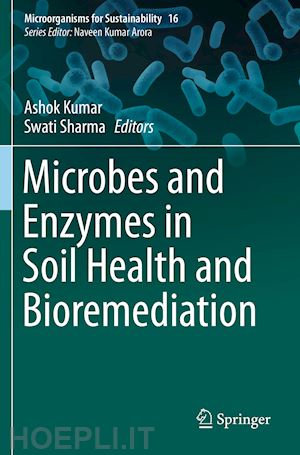
Questo prodotto usufruisce delle SPEDIZIONI GRATIS
selezionando l'opzione Corriere Veloce in fase di ordine.
Pagabile anche con Carta della cultura giovani e del merito, 18App Bonus Cultura e Carta del Docente
Microbial enzymes play a vital role in maintaining soil health and removing pollutants from contaminated land. Soil microflora is closely associated with maintaining soil fertility, and the use of chemical pesticides, fertilizers and other volatile sprays in agriculture threatens the health ofthe microbial population in the soil. Every single particle of healthy soil contains millions of bacteria, which interact with the nutrients available, sustaining the nutrient cycle and making this microflora an essential component of life on earth. How do microbes help in the nutrient cycle? Either by intracellular digestion of macromolecules and converting these into smaller units in their metabolic pathways, or by secreting enzymes into the extracellular environment to facilitate the conversion of complex macromolecules into micro-molecules that can be easily absorbed by other living species. To meet demands for energy and food for the growing global population, it is important to protect agricultural land from contamination and maintain its productivity. Heavy metal ions from contaminated land canenter crops, fish or aquatic organismsvia contaminated water, and theseare then taken up by the human body, where they can accumulate and alter the normal microflora.
The microbiological component of the soil is ahighly complex system and is still not fully understood. How do microbes survive in the changing physicochemical environment of soil?. This book helps readers understand the mechanism, various routes of microbialsoil remediation, the interactionsof different genera, and how microbial enzymes support the sustainable restoration of healthy soil.Dr. Ashok Kumar is an Assistant Professor at the Department of Biotechnology and Bioinformatics, Jaypee University of Information Technology, India. He completed his Ph.D. in Biotechnology at the Department of Biotechnology, Himachal Pradesh University, India, and worked as a postdoctoral fellow at the State Key Laboratory of Agricultural Microbiology, Huazhong Agricultural University, China. He also worked as a Brain Pool researcher/Assistant Professor at Department of Chemical Engineering Konkuk University Seoul South Korea.. Dr. Ashok has a keen interest in enzyme immobilization, biomaterials, biopolymers, nanobiotechnology, biocatalysis, waste management, biomass degradation, biofuel synthesis, and biotransformation. He has published 47 research papers in various internationally respected journals, 1 book, and 15 book chapters.
Dr. Swati Sharma completed her Ph.D. from Department of Chemical and Natural Resources Engineering Universiti Malaysia Pahang , Malaysia. She worked as a Visiting Researcher at the College of Life and Environmental Sciences at Konkuk University, South Korea. Dr. Sharma has completed her masters (M.Sc.) at the Dr. Yashwant Singh Parmar University of Horticulture and Forestry, India, and she also worked as a Program Co-coordinator at the Himalayan Action Research Center, Dehradoon and Senior Research Fellow at the India Agricultural Research Institute. Dr. Sharma's current research is in the field of bioplastics, hydrogels, keratin nano-fibers and nanoparticles, biodegradable polymers and polymers with antioxidant and anti-cancerous activities and sponges. Dr. Swati has published 16 research papers in various respected international journals, 1 book, and a number of book chapters.











Il sito utilizza cookie ed altri strumenti di tracciamento che raccolgono informazioni dal dispositivo dell’utente. Oltre ai cookie tecnici ed analitici aggregati, strettamente necessari per il funzionamento di questo sito web, previo consenso dell’utente possono essere installati cookie di profilazione e marketing e cookie dei social media. Cliccando su “Accetto tutti i cookie” saranno attivate tutte le categorie di cookie. Per accettare solo deterninate categorie di cookie, cliccare invece su “Impostazioni cookie”. Chiudendo il banner o continuando a navigare saranno installati solo cookie tecnici. Per maggiori dettagli, consultare la Cookie Policy.